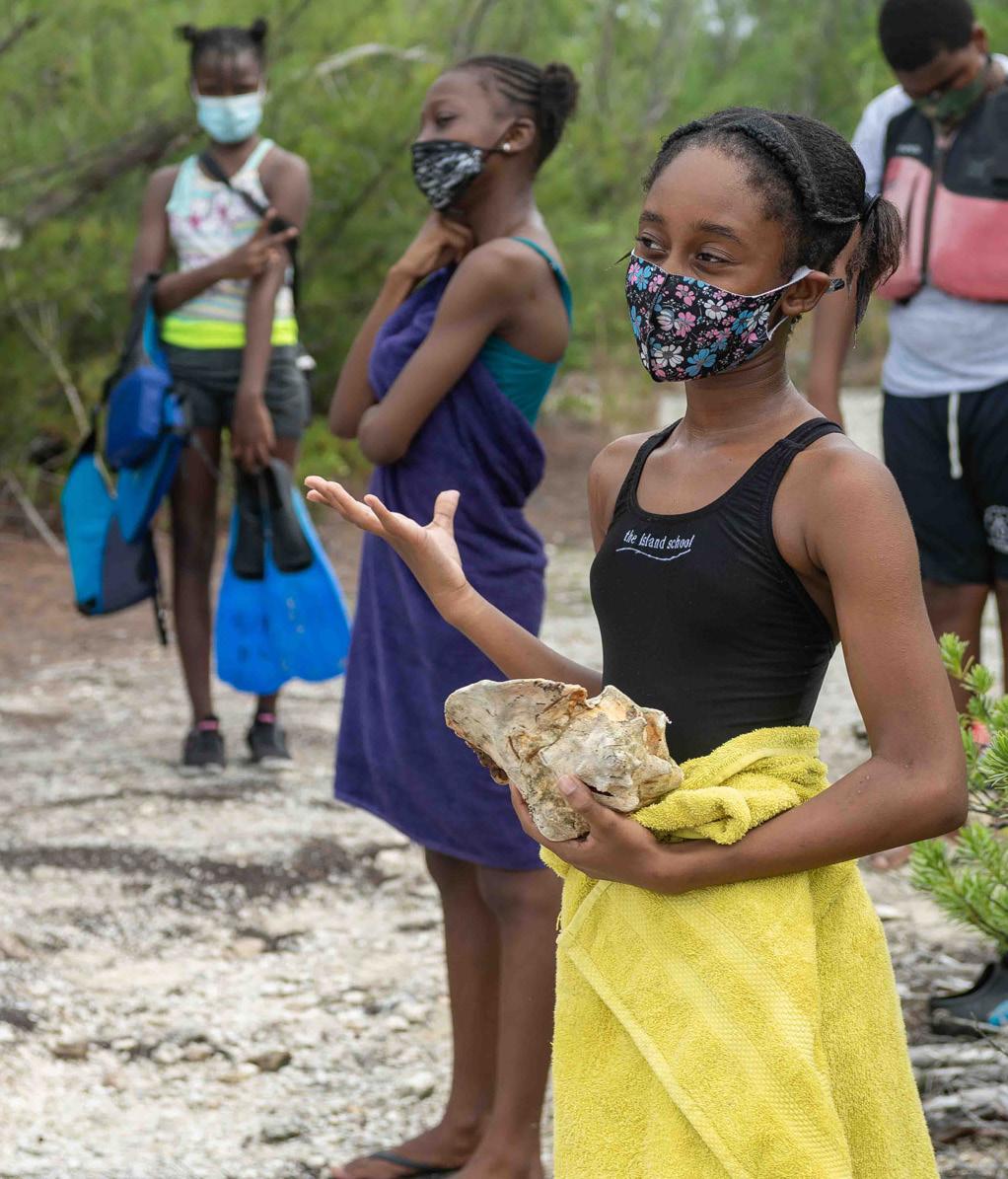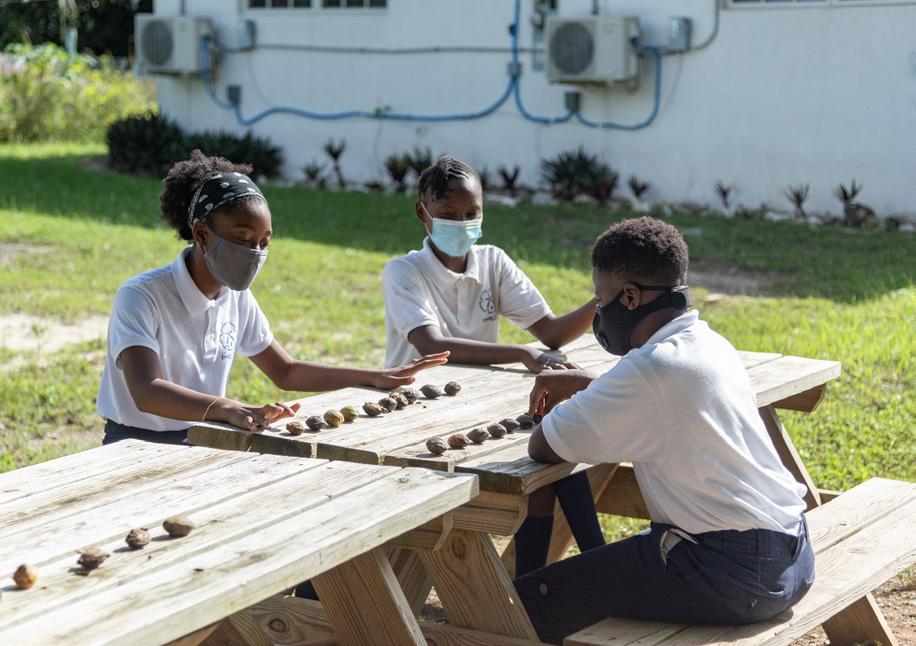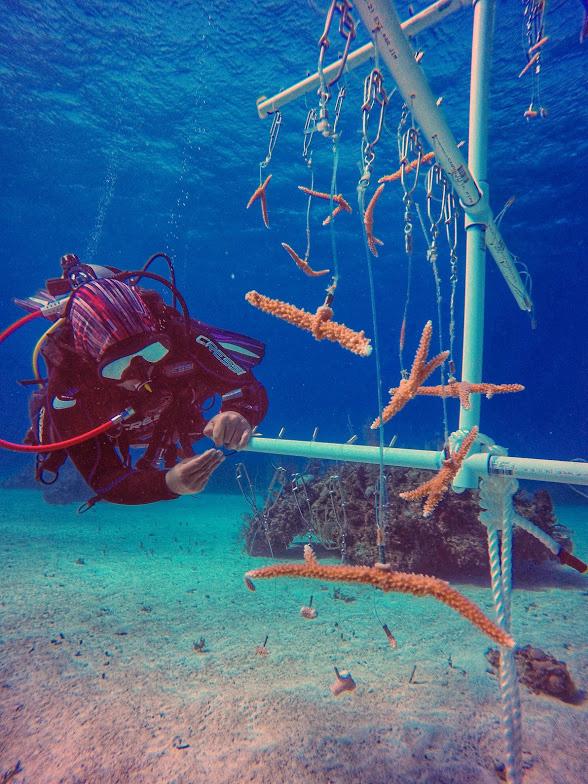
5 minute read
Innovative Solutions to Global Challenges
INNOVATIVE SOLUTIONS
TO GLOBAL CHALLENGES
BY KATY WALZ, PRINCIPAL, DEEP CREEK MIDDLE SCHOOL
Spring 2020 called for innovative solutions to global challenges, and Deep Creek Middle School answered the call with compassion and creativity. In keeping with our values as a nurturing community, we supported our students and families as they navigated our new virtual learning platform. We launched our 1:1 laptop program to ensure all students could fully participate in virtual learning, and we broadened our skills as educators to remotely deliver exceptional learning experiences.
As we envision education during a pandemic, outdoor education offers an exciting path forward, and DCMS is fortunate to have adopted this approach to learning since our inception. In preparation for in-person learning, we developed policies and procedures to prioritize health and safety, including constructing two new outdoor classrooms. Following government guidelines, we brought our DCMS community of faculty and students together for a solid stretch of in-person programming this fall. It was such a joy to see smiling faces (behind masks), hear laughter, and see engaged, curious students on our campus. Our morning welcome shifted to include temperature checks and health screenings, but it was a morning welcome nonetheless, building community and love for learning.
A highlight of our fall, and hopefully a model for education as we see a global shift in learning, was our Schools Without Walls week. As we’ve done in the past, we brought over 40 students into the field, engaging with the natural world around them on our Island School campus. Guided by scientists and researchers at CEIS, Island School faculty and our Waterfront team, students discovered the anatomy of black land crabs through handson dissection, observed the behaviors of stone crab and spiny lobster in the CEI wetlabs, explored coastal marine ecosystems, and practiced newlyacquired SCUBA skills in confined and open water dives.
During these uncharted times, we aim to model place-based education that safely delivers authentic opportunities for learning and leadership. Our community has learned how to rapidly and thoughtfully shift between virtual and in-person instruction and is prepared to continue adapting as needed in the coming months. We’re proud of our community’s creativity and resilience, and we are confident that together we will continue to grow and flourish.



KATY WALZ
Katy Walz is no stranger to Eleuthera, even as a native of Chicago, Illinois. She is thrilled to be living on the Cape with her husband Jack and their three children, rapidly growing connected to the vibrant Deep Creek Middle School community. Katy grew up in the US, but met her husband Jack, a native of Tarpum Bay, Eleuthera, early in her professional career as an educator. She is well-versed in both The Bahamas and the US education systems and brings a wealth of knowledge, as well as an incredibly warm spirit, sense of humor, and can-do attitude to the Cape Eleuthera Island School community.
It’s been an exciting start to the school year to say the least, but I continue to be energized by a lively group of students, dedicated teachers, and a generous, welcoming community. We are all working together to provide the best outcomes for our students.”
Subsistence Fisheries & Food Security

BY DR. NICK HIGGS, DIRECTOR OF SCIENCE & ENGINEERING
Subsistence and artisanal fisheries have played a vital role in sustaining human populations of The Bahamas for hundreds of years, particularly in times of hardship. The onset of the coronavirus pandemic earlier this year led to a dramatic rise in unemployment throughout the country and fears around food-security. As scientists and researchers, we are always seeking ways to live sustainably and work in concert with the environment.
Subsistence fishing was one of the few activities permitted during emergency curfew restrictions, leading many to turn to the sea for food. Living on the Cape, I saw this first-hand with increasing numbers of people fishing conch on the shallow flats around our campus as the lockdowns took hold. To better understand this phenomenon, we started a study of conch landings along the shore, collecting and measuring conch shells each week to document the effect that COVID-19 was having on fisheries. In 2005, this small scale conchfishery was the subject of the first ever study published by CEI, giving us a useful historic baseline to compare with.
We found a sharp increase in fishing activity at the start of the lockdown period, the fishing equivalent of ‘panic-shopping’. After three weeks, fishing activity dropped sharply and remained at low levels for the 12week duration of the study. At least 87 kg of conch meat was harvested during this time, providing ~440 meals of high quality protein to the local community.
Unfortunately, we also saw an increase in the proportion of small and juvenile conch being taken, with almost 90% of the catch being illegal-sized animals. Before the pandemic this figure was at ~80% illegal-sized and in 2003 was at 60%, so we’re seeing a worrisome trend towards taking more and more small conch. These smallscale fisheries for conch play an important role in food security during emergencies like pandemics or after hurricanes, providing a readily accessible source of local food and income for those worst affected. Our job is to continue collecting data and work with the government and local authorities to protect these important resources for future emergencies and ongoing sustainability.
Similarly, visiting scientist Bill Bigelow is studying the impact of climate change on land crabs, another important local food source. And, we welcomed Andy Cartwright to our farm team recently and are thrilled to bring his expertise to our campus, turning our permaculture project into a long term, sustainable food resource for our community. Already, we’ve landscaped sections of our farm and campus to create more room for food production while using the landscape to our benefit.











